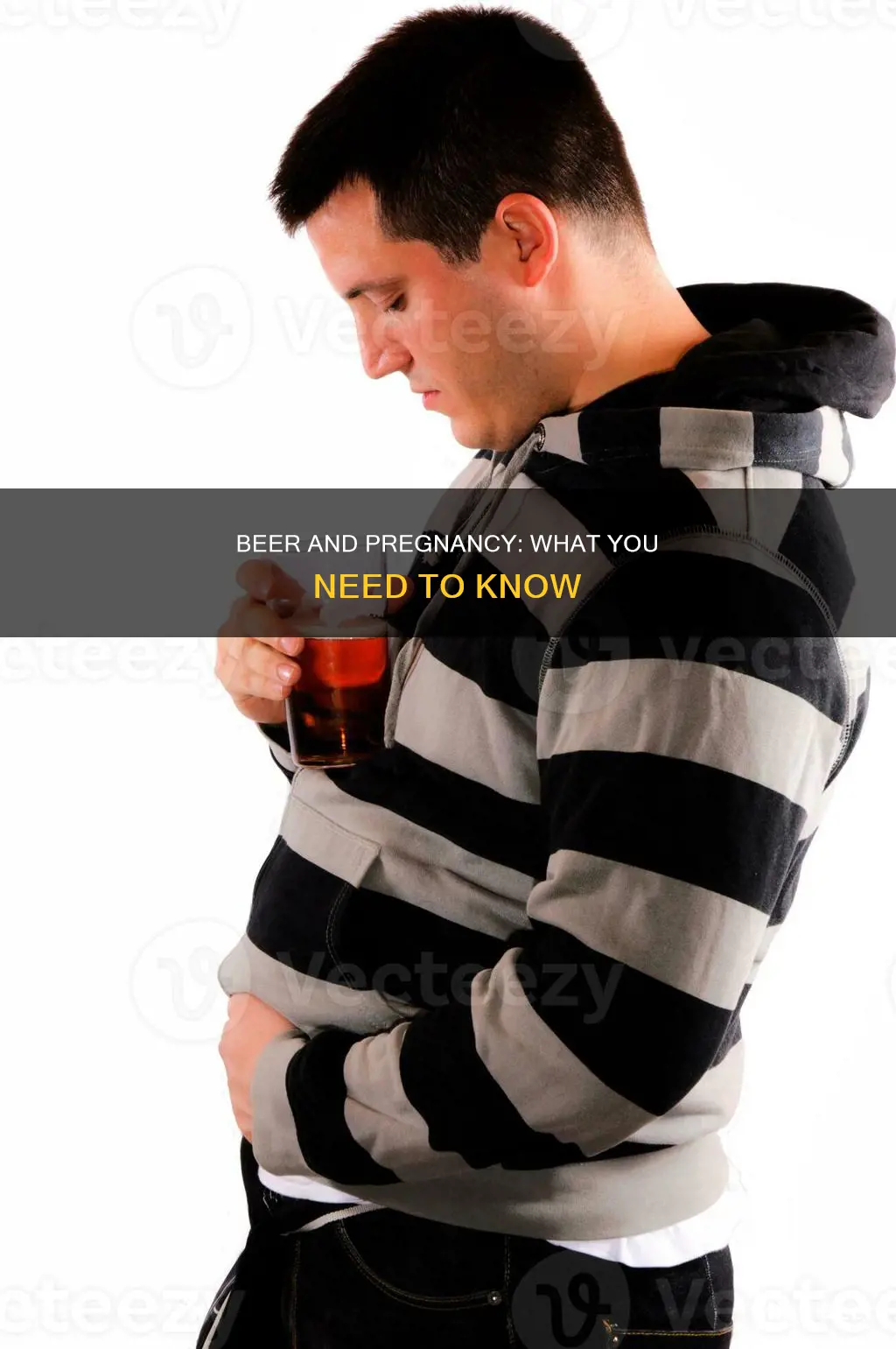
Drinking alcohol during pregnancy can have adverse effects on the baby, and as such, it is recommended that pregnant women abstain from drinking alcohol. Alcohol is known to pass from the mother's blood through the placenta or umbilical cord to the baby, who is unable to process it due to an underdeveloped liver. This can lead to serious issues with the baby's development, including fetal alcohol spectrum disorder (FASD), which can cause problems with learning, behaviour, joints, bones, muscles, organs, managing emotions, and developing social skills. The more a pregnant woman drinks, the greater the risk to the baby, with heavy drinking leading to an increased risk of miscarriage, premature birth, and low birth weight. While the effects of occasional light drinking are less understood, there is no known safe amount of alcohol consumption during pregnancy, and even non-alcoholic beers may contain small amounts of alcohol. Therefore, pregnant women are strongly advised to refrain from drinking any alcohol to minimize the risk to their baby.
| Characteristics | Values |
|---|---|
| Risk to the baby | Alcohol can cause long-term harm to the baby, with the risk increasing with the amount consumed |
| Alcohol breakdown in the baby's body | The baby's body cannot process alcohol as it does not have a fully developed liver |
| Miscarriage | Drinking alcohol during pregnancy increases the risk of miscarriage |
| Premature birth | Drinking alcohol during pregnancy increases the risk of premature birth |
| Low birth weight | Drinking alcohol during pregnancy increases the risk of low birth weight |
| Fetal Alcohol Spectrum Disorder (FASD) | Drinking during pregnancy can cause FASD, which can lead to problems with learning, behaviour, joints, bones, muscles, organs, emotions, social skills, hyperactivity, and impulse control |
| Fetal Alcohol Syndrome (FAS) | Heavy alcohol consumption during pregnancy can lead to FAS, which includes symptoms such as behavioural and attention problems, changes in facial shape, poor growth, and problems with movement and speech |
| Impact on the mother | Drinking alcohol during pregnancy may be associated with high blood pressure and preeclampsia in the mother |
| National health organizations' recommendations | National health organizations recommend complete abstinence from alcohol during pregnancy |
| Impact of occasional drinking | The effects of occasional drinking during pregnancy are less understood and require further research |
What You'll Learn

Drinking beer and pregnancy loss
Pregnant women are strongly advised to abstain from drinking alcohol, including beer, during pregnancy. Beer is an alcoholic beverage, and consuming it can put the pregnancy at risk of complications, including pregnancy loss, preterm birth, and lifelong disabilities for the baby.
Alcohol's Impact on Pregnancy
When a pregnant woman consumes alcohol, it passes from her bloodstream through the placenta and umbilical cord to the baby, remaining in the baby's body for extended periods. The baby's immature liver cannot process alcohol effectively, leading to potential harm and long-term damage.
Risks of Drinking Beer During Pregnancy
Beer consumption during pregnancy has been linked to an increased risk of miscarriage, also known as pregnancy loss. A 2020 study revealed that each week of alcohol consumption between 5 and 10 weeks of pregnancy elevated the chances of miscarriage by 8%. Additionally, a 2019 review found that for pregnant individuals who drank five or fewer alcoholic drinks per week, each additional drink increased their risk of miscarriage by 6%.
Drinking beer during pregnancy can also lead to preterm birth, with heavy drinking (around 5 drinks per day) increasing the likelihood. Consuming alcohol during the second and third trimesters elevates the risk of preterm delivery.
Fetal Alcohol Spectrum Disorders (FASDs)
Excessive alcohol consumption during pregnancy can result in a group of defects known as Fetal Alcohol Spectrum Disorders (FASDs). These disorders include fetal alcohol syndrome (FAS), which can cause physical and developmental issues, including:
- Vision and hearing problems
- Developmental delays
- Trouble concentrating and paying attention
- Learning and behavioral issues
- Social difficulties
- Substance abuse disorders
- Low birth weight
- Premature birth
Recommendations for Pregnant Women
To minimize risks, pregnant women are advised to refrain from drinking any amount of beer or other alcoholic beverages during pregnancy. The CDC, the U.S. Surgeon General, the American College of Obstetricians and Gynecologists, and the American Academy of Pediatrics all recommend avoiding alcohol entirely while pregnant.
If you are pregnant and struggling with alcohol use, it is crucial to seek help from a healthcare provider or support organizations like Alcoholics Anonymous.
Drinking Beer in Doha: What's the Deal?
You may want to see also

Alcohol's impact on the developing foetus
The dangers of alcohol consumption during pregnancy are well-documented, with heavy drinking known to cause birth defects and a group of defects known as Fetal Alcohol Syndrome (FAS). FAS can cause physical abnormalities, including changes in facial features, and a small head, as well as problems with organ formation, such as the heart and joints. Children with FAS often experience learning difficulties, behavioural issues, and problems with social skills, hyperactivity, and impulse control. These issues can persist throughout their lives, requiring lifelong assistance and support.
While the effects of heavy drinking during pregnancy are clear, the impact of occasional or light drinking is less well understood. Some studies suggest that low to moderate alcohol consumption may not have adverse effects on the developing foetus. For example, a 2012 Danish study found no difference in the cognitive and executive functioning of 5-year-old children whose mothers drank low to moderate amounts of alcohol during pregnancy compared to those who abstained. However, it is important to note that the children's brains were still developing at the time of the study, and the full effects of alcohol may not have been apparent.
Despite the lack of conclusive evidence on the effects of light or moderate drinking, national health organisations and medical professionals generally recommend complete abstinence from alcohol during pregnancy. This is because there is currently no known "safe" amount of alcohol use during pregnancy. Even occasional binge drinking can greatly increase the risk of alcohol-related harm to the foetus, and it is difficult to predict the impact of drinking on any given pregnancy due to varying levels of the enzyme that breaks down alcohol. Therefore, to minimise any potential risks to the developing foetus, pregnant women are strongly advised to refrain from consuming any alcohol.
Beer and Hyperthyroidism: What You Need to Know
You may want to see also

Drinking beer and high blood pressure during pregnancy
Drinking Beer During Pregnancy
It is widely recommended that pregnant women avoid drinking alcohol altogether. Alcohol is known to pass from the mother's blood through the placenta and umbilical cord to the baby, who cannot process it effectively. The more a pregnant woman drinks, the greater the risk to the baby. Heavy drinking during pregnancy can lead to miscarriage, premature birth, low birth weight, and a group of defects in the baby known as fetal alcohol syndrome (FAS). FAS can cause physical abnormalities, as well as lifelong behavioural, cognitive, and health problems.
High Blood Pressure During Pregnancy
High blood pressure during pregnancy, known as gestational hypertension, often resolves after birth. However, it can increase the risk of developing chronic high blood pressure later in life. Additionally, pregnancy-related high blood pressure disorders like preeclampsia and eclampsia can cause severe and life-threatening complications for both parent and baby. A 2018 study found a link between alcohol consumption and high blood pressure during pregnancy, with pregnant individuals who consumed more than 12.5 alcoholic drinks per week having higher odds of experiencing pregnancy-related high blood pressure disorders.
Overall Recommendations
While the effects of light drinking during pregnancy are not yet fully understood, it is generally advised that pregnant women avoid alcohol completely. The risks associated with heavy drinking are well-established, and there is no known "safe" amount of alcohol consumption during pregnancy. The CDC, the U.S. Surgeon General, the American College of Obstetricians and Gynecologists, and the American Academy of Pediatrics all recommend that pregnant women abstain from alcohol. Given the potential risks to both mother and baby, it is best to avoid alcohol altogether during pregnancy and to consult a healthcare provider if you need help reducing your alcohol intake.
Beer and Macros: Can You Drink and Stay on Track?
You may want to see also

Drinking beer and premature birth
Drinking beer and other alcoholic beverages during pregnancy is strongly advised against by official health bodies such as the NHS, the CDC, and the American College of Obstetricians and Gynecologists. This is because alcohol is known to increase the risk of premature birth, along with other serious complications.
When a pregnant woman drinks alcohol, it passes from her bloodstream through the placenta and umbilical cord to the baby, which does not have a fully developed liver and cannot process alcohol effectively. As a result, the baby's blood alcohol level remains elevated for longer than that of the mother, potentially causing serious harm to the baby's development.
Risks of Drinking Beer During Pregnancy
Drinking beer during pregnancy has been linked to an increased risk of premature birth, low birth weight, and fetal alcohol spectrum disorders (FASD). FASD can cause a range of problems for the baby, including learning and behavioural issues, problems with joints, bones, muscles, and organs, hyperactivity, and difficulties with social skills and communication.
There is no known "safe" amount of alcohol consumption during pregnancy. Even small amounts of alcohol can affect a developing baby's brain. Binge drinking (typically defined as five or more drinks in one sitting for women) greatly increases the risk of alcohol-related harm to the baby, but even moderate amounts of alcohol have been linked to an increased risk of miscarriage.
Recommendations for Pregnant Women
To minimise any risk to the baby, it is recommended that pregnant women abstain from drinking alcohol completely. This includes beer, as even beers labelled as ""non-alcoholic" or "low-alcoholic" may contain trace amounts of alcohol.
Drink a Beer: Who's the Songwriter?
You may want to see also

Drinking beer and stillbirth
Drinking beer during pregnancy can have serious consequences for both mother and baby. While the specific effects of low to moderate alcohol consumption during pregnancy are not yet fully understood, heavy drinking is known to cause birth defects and is linked to a group of defects known as fetal alcohol syndrome (FAS).
FAS is a lifelong and irreversible condition that can cause physical and cognitive problems for the child. These can include changes in facial features, poor growth, problems with movement and balance, and difficulties with speech, learning, and behaviour. Heavy drinking during pregnancy can also lead to premature birth, low birth weight, and stillbirth.
The effects of drinking beer specifically have been studied, and it has been found that there is no amount of beer that is considered safe to consume during pregnancy. Even non-alcoholic beers may contain small amounts of alcohol, and can therefore pose a risk to the developing fetus.
The CDC and the American College of Obstetricians and Gynecologists (ACOG) advise that pregnant women should avoid drinking any amount of alcohol, including beer. This is because any alcohol that enters the bloodstream of the pregnant person will pass to the baby via the umbilical cord. The baby's body breaks down alcohol much more slowly than an adult's body, so the baby's blood alcohol level remains high for longer, which can cause harm.
The risk of stillbirth is also increased by drinking alcohol during pregnancy. A 2019 review found that for pregnant people who drank five or fewer alcoholic drinks a week, each additional drink per week increased their risk of miscarriage by 6%. Furthermore, a 2020 study found an 8% increased risk of pregnancy loss each week between 5 and 10 weeks of gestation in patients who consumed alcohol compared to those who abstained.
While the effects of low to moderate alcohol consumption during pregnancy require further research, the current body of evidence suggests that it is best for pregnant women to avoid drinking beer or any other type of alcoholic beverage. The potential risks to the baby are serious, and until more is known about the effects of low-level alcohol consumption during pregnancy, abstinence is the safest choice for expectant mothers.
Dry January: Non-Alcoholic Beer – Friend or Foe?
You may want to see also
Frequently asked questions
There is no known "safe" amount of alcohol use during pregnancy. Even a beer that’s labeled “non-alcoholic” may contain some traces of alcohol. It is recommended that pregnant women do not consume any alcohol to keep the risk to their baby to a minimum.
Drinking during pregnancy can cause an increased risk of miscarriage, premature birth, stillbirth, and your baby having a low birth weight. It can also affect your baby after they're born, causing developmental delays, behavioural problems, and health problems such as seizures and visual or hearing impairment.
Women who find out they're pregnant after already having drunk in early pregnancy should avoid further drinking for the rest of their pregnancy. However, they should not worry unnecessarily as the risks of their baby being affected are likely to be low.







